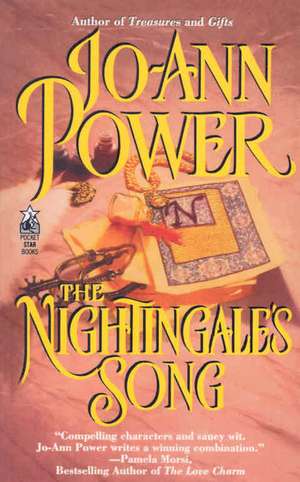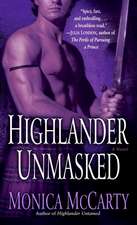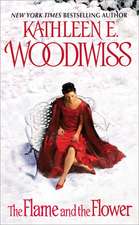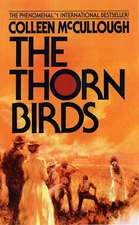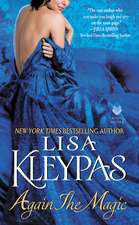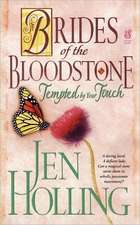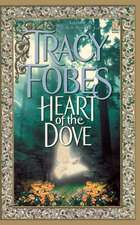The Nightingale's Song
Autor Jo-ann Poweren Limba Engleză Paperback – 31 aug 2007
The Dragon is coming for Clare, countess of Trent. For years Clare -- secretly The Nightingale, writer of heroic adventures -- has fought being wed to a man of King Henry's choosing. But as Welsh rebels swoop down toward her castle and King Henry's men march to meet them, she is finally caught in the king's net: he is now determined to marry Clare to the profligate nephew of the knight known as The Dragon.
Astride his black charger, The Dragon rides through snow and sleet, seeking his nephew's appointed bride. When villains attack, a daring maiden rescues him -- a Valkyrie of courage -- the Countess Clare. In one glorious moment, he loses his heart to the woman he'd vowed to deliver to another man. As desire overtakes him, danger comes nigh to them both. Surrounded by treachery, both The Nightingale and The Dragon feel their only hope beating in their hearts...their everlasting love....
Preț: 124.25 lei
Nou
Puncte Express: 186
Preț estimativ în valută:
23.77€ • 24.89$ • 19.67£
23.77€ • 24.89$ • 19.67£
Carte disponibilă
Livrare economică 17-31 martie
Preluare comenzi: 021 569.72.76
Specificații
ISBN-13: 9781416575849
ISBN-10: 1416575847
Pagini: 304
Dimensiuni: 127 x 203 x 20 mm
Greutate: 0.29 kg
Editura: Gallery Books
Colecția Gallery Books
ISBN-10: 1416575847
Pagini: 304
Dimensiuni: 127 x 203 x 20 mm
Greutate: 0.29 kg
Editura: Gallery Books
Colecția Gallery Books
Extras
Chapter 1
Cheshire, England
November 1403
"In winter's snow, at umber hour,
he came most silent to my bower.
Stark in his need, he built the fire
with honor's ash for love's desire."
"My lady, this knight is dishonorable?" Clare's scribe lifted her quill from the parchment, dribbling black ink upon the ivory expanse.
"On the contrary, he is his liege lord's right arm."
"But he intrudes upon his beloved's bedchamber? A lady whom he should respect from afar? He even arrives in the middle of the night, and clearly, he should not be there? My lady, I do not think this will sell -- !"
"This is one of those stories of chivalry, Mary." Clare smiled tolerantly at the young woman whose skill for writing extended only to her dexterous hands, not yet to her heart.
"We have created heroic adventures before, but never tales of love."
"I know, but that does not mean we can't."
"Nay." Mary shook her head, adamant. "But I thought you said we would next produce the life of our late King Richard."
"We'll begin that soon." In a better place. Where I may write with a freer hand. "I wanted to record this new idea of mine quickly. We'll warm ourselves on these cold winter nights with this fiction about devotion. Fear not, the hero will uphold his honor and hers."
"I am glad to hear it, my lady, for I do not want to write about men whom others cannot respect."
"Nor I. So, let us continue. We've introduced him and now we must meet him, see him as the reader does, and then enjoy him." Does a man exist who can meet a woman, see her, and enjoy her for her mind? Clare laughed at that one!
Mary looked at her as if she were losing her sanity again. Poor Mary. Being a scribe, she knew little about this imagination process and her tolerance for Clare's mental escapades was short.
Clare cleared her throat and pretended seriousness. "Ah, well...we must have a few lines about his appearance, shouldn't we? His hair and his eyes."
"Oh, my lady, that's a simple task. We give him the usual mien for these fables. Golden hair. Gray or pale blue eyes."
"I think not. This man is larger -- " Clare spread her hands the width she'd wish his chest might span and knew no mortal man could match it. "Much larger than myth. Mayhaps, he is dark. Quite ruddy. With sturdy arms and thighs like -- "
"Oak. The usual, I know." Mary was bored by this.
"Trunks of oak!" Clare corrected her.
"But if you give him black hair and eyes, no one will believe he is to be the hero. That is traditional coloring for an evil lord."
"Aye, but when he first comes to the heroine's castle, he is her foe. The darkness suits him, Mary."
"Well, I will try to like him...." The girl shook her head, unconvinced, but applied her goose feather quill to parchment again. "What happens next?"
Mary was drumming her fingers on her tabletop by the time Clare spoke again. "I would like him to walk to her. When he stands before her, he should say something similar to
Bid me stay or make me go,
but tell me quick what I must know.
Can you love me? Will you have me
For one hour of bliss?"
"Oh, that's lovely." Mary was scribbling madly.
"You like this now?"
"Not his looks, I don't. He doesn't have scars or an eye missing, does he?" The scribe donned that look Clare called Ever-wary Mary.
"Only one scar that she can see. We'll put it across his brow, I think. But he lacks nothing. Save the ability to love."
"That's not courtly!"
"Mary," she chuckled, "he learns it here with the lady of the story, though he hates to acknowledge it. She has problems, too. We hear about them when she responds to his invasion of her bedchamber. This should be a sad summary. She should think to herself...something akin to
I rose, a rebel to sire, king.
Future gone with betrothal ring."
"Hmmm, I like the ideas. But the rhythm's wrong."
"We'll refine the meter before you must put it in good calligraphy on the vellum." Clare strode to her frosted window, looked out upon the falling snow, and fingered the loathsome paper that inspired this soothing shower of creativity -- the latest of King Henry's orders to her father and, most pointedly, to her. "Mayhaps, that last line should read, 'Future cast off with gown and ring.'"
"She's naked?" Ever-wary Mary could certainly screech.
"Well, of course."
"My lady!" Mary plunked her quill upon her table. "This sounds too much like those scandalous French lais where passion overrules common sense."
"Don't you think that is what happens when one craves another?"
"I don't know, my lady." The servant stared at her, defiant as if she asked, How do you know?
Clare didn't. Among the suitors whom her father had paraded before her, none had ever attracted her eye and her head at the same time. No man had ever appealed to her heart, either. So whether or not she had the ability to love any man was a question that begged an answer. But just as she had not married one of her father's candidates, she could not allow herself to be dragged into a loveless union planned for her by the king.
She peered down at the document she had received less than an hour ago from Henry. She held her future between her fingers, decreed with a monarch's signature and sealed by his ring against her will. His sentence became hers. Marriage to a man -- a younger man -- reputed to be as lusty as her father.
Her sire's past certainly proved to her that desire for worldly pleasures could warp reason. Destroy others' lives. Make children, like her brother, John, and her sister, Blanchette, curse the man who ignored them as they watched their father sate his three hungers.
The first was for women, beginning with three heiresses whom he had married -- and buried. Continued with two mistresses whom he had ensconced in this castle -- until he turned them out for infidelity. Then played out with the procession of whores who spread across his bed for a night and scattered bastards into the countryside proving that he merited his reputation as a tyrant with a satyr's appetite.
His second greed was for regal favor, which swayed his loyalty with every breeze and shifted toward whatever army occupied his lands.
Whenever the soldiers planned to march on, Aymer de Wallys, fourth earl of Trent, would exhibit his third avarice. His devotion to Henry of Lancaster or his predecessor, Richard II, could be counted upon -- aye, weighed -- by the gold each royal lord dropped into Aymer's purse.
Clare shivered in the cool November air. Never having witnessed love or even loyalty among noble men or women, she felt the irrational need to assume its existence and explore its nature by the only means at her disposal -- in fiction. Her little troupe of women would help her produce this tale just as they had her other books. Her tiny band of six depended upon her for their livelihoods, their treasured independence and their shelter from the cruel world beyond the cozy tower workshop of Castle Trent.
Clare turned to answer Mary more fully. How could she encourage the young woman to use her imagination if she were not free with her own thoughts and reasonings? "We will imagine we know what passion is, Mary. We'll write of how extraordinary this hero is. Of his
Fierce eyes, firm lips,
moist flesh of rippling muscle
Long shanks and longer -- "
"My lady, you cannot write that!"
Clare sighed. "Now, Mary...." He's my hero and I'll create him as I want him.
"'Tis not seemly, madam. The Nightingale has a reputation to uphold!" The apprentice cast wide her hands. "The Nightingale is a man -- or so the world believes."
"Because more men are literate than women, and because we wish to attract as many patrons as possible for the highest price, we create the illusion that this enterprise is run by a man, Mary. But I care not who learns I am a woman."
"I know we use the pseudonym because most popular writers do it, but -- "
"It adds mystery to a writer's allure. But if male writers can prosper under false names without public censure, I see no reason why a woman can't."
"Nor do I, madam."
"Then what is your problem here, Mary?"
"You must know that I am extremely proud that you have made such an impression on the world. But you have made it among literate people like dead King Richard and his cousin, the new king, as a writer of histories and fables and quests by purest knights. Minstrels may sing in the streets of...of flesh," -- she mouthed the last -- "but we write for noble ladies' troubadours to learn our stories to recite after supper in the great halls. These women are refined."
"These women, Mary, have appetites for more rousing tales than poets tend to give them."
"But no English lady weaves a story of secular love so bawdy!"
"Then it is past time for the Nightingale to try her wings at romance."
"I am not opposed to writing more and earning more. I do like money, madam. But I doubt any Englishman will want to read this story from a woman's -- a dishonorable woman's -- point of view! No one will buy it! Even your agent in Calais has said we must be careful about how we construct the character of the hero and heroine for our patrons here as opposed to those on the Continent. For English readers, our characters in any work, adventure, or romance must be pure as driven snow! But for Frenchmen or Viennese, the more intemperate, the richer the sale! Nay, I say we will not profit from this if this romance is for an Englishman. Pigments, inks, vellum, and leather covers are very costly. I have helped you with the ledgers and I know our expenses."
"Mary, if you fear you will not be able to afford to send your share of next year's earnings home to your mother and her brood, cease your fretting."
The past year had been so profitable that Clare already had laid up enough gold coins in her coffer to pay her workers their annual stipend. Usually she paid them on Christmas Day. But she would not stand on ceremony this year. As soon as her father's illness took him from this world and she had seen him appropriately buried, she would dispense to her staff their rewards and leave Castle Trent and its problems forevermore. Then she would use the rest of her well-gotten gain to sail to France, where she would spend the rest of her life devoting herself only to her art. She would begin by using the precious collection of King Richard's handwritten memoirs to compose her life of him without interference from his successor, Henry. Richard had secretly sent them to her two months before he died, and she yearned to tell the world what torment he had endured at Henry's imprisonment. What's more, she'd do it with the French king's blessings, at his court with a new group of ladies to assist her who would be paid from that regent's pockets.
With the expectation of that artistic freedom and financial fortune about to become hers, Clare decided to calm Mary further by relating an embellishment of the truth. "No man wants this book, Mary. A woman has already commissioned this work. A wealthy countess who steadily grows richer. One who has always wished to meet a legendary man."
Mary wrinkled her nose, her rabbit's eyes warming slowly to the idea of her share of their newest patron's payment. "A man whose feats might rescue her from the burden of her dreary days?"
Clare did not believe that a man or a woman had the power to solve all trials and tribulations of their loved one. "I have seen a few partners who were joyful in each other's company, Mary. Their sharing seemed to ease life's vicissitudes and multiply its blessings. We will write that our lovers remain together at the end and live happily as possible ever after. Aye." Clare raised her palm against Mary's next argument. "I know that is not the favored convention for the conclusion to a romance. But the lady who wishes this tale told wants it that way. So shall it be."
Clare welcomed the challenge of producing a story she considered a fable. But she would also use the fairy tale to salve the wound carved by her belief that no man could cherish one woman solely, wholly, honorably till death parted him and his beloved.
She crumpled King Henry's letter in her hand. That man's decree made one aspect of her motive to write this romance clear. What she proposed to write was a story about a woman who could find a man to love and then surrender the course of her existence to him. Clare herself thought that real fiction, for she could never give herself to any man to control.
She was a woman who took the story of her life into her own hands. A woman who would foil her father after his death just as she had in life. A woman who would defy her king and this king's man -- this Jordan Chandler, this fabled Dragon -- who would come at Henry's command after the New Year to demand she marry his nephew.
But the Nightingale had a surprise in store for the illustrious Dragon. When he arrived at Castle Trent to carry her away and marry his nephew, he would find her gone. He could sit by the fire downstairs and hear the tale of the lady who had once lived in Castle Trent. One mortal woman who valued action above all and who flew away to create her own paradise.
Copyright © 1997 by Jo-Ann Power
Cheshire, England
November 1403
"In winter's snow, at umber hour,
he came most silent to my bower.
Stark in his need, he built the fire
with honor's ash for love's desire."
"My lady, this knight is dishonorable?" Clare's scribe lifted her quill from the parchment, dribbling black ink upon the ivory expanse.
"On the contrary, he is his liege lord's right arm."
"But he intrudes upon his beloved's bedchamber? A lady whom he should respect from afar? He even arrives in the middle of the night, and clearly, he should not be there? My lady, I do not think this will sell -- !"
"This is one of those stories of chivalry, Mary." Clare smiled tolerantly at the young woman whose skill for writing extended only to her dexterous hands, not yet to her heart.
"We have created heroic adventures before, but never tales of love."
"I know, but that does not mean we can't."
"Nay." Mary shook her head, adamant. "But I thought you said we would next produce the life of our late King Richard."
"We'll begin that soon." In a better place. Where I may write with a freer hand. "I wanted to record this new idea of mine quickly. We'll warm ourselves on these cold winter nights with this fiction about devotion. Fear not, the hero will uphold his honor and hers."
"I am glad to hear it, my lady, for I do not want to write about men whom others cannot respect."
"Nor I. So, let us continue. We've introduced him and now we must meet him, see him as the reader does, and then enjoy him." Does a man exist who can meet a woman, see her, and enjoy her for her mind? Clare laughed at that one!
Mary looked at her as if she were losing her sanity again. Poor Mary. Being a scribe, she knew little about this imagination process and her tolerance for Clare's mental escapades was short.
Clare cleared her throat and pretended seriousness. "Ah, well...we must have a few lines about his appearance, shouldn't we? His hair and his eyes."
"Oh, my lady, that's a simple task. We give him the usual mien for these fables. Golden hair. Gray or pale blue eyes."
"I think not. This man is larger -- " Clare spread her hands the width she'd wish his chest might span and knew no mortal man could match it. "Much larger than myth. Mayhaps, he is dark. Quite ruddy. With sturdy arms and thighs like -- "
"Oak. The usual, I know." Mary was bored by this.
"Trunks of oak!" Clare corrected her.
"But if you give him black hair and eyes, no one will believe he is to be the hero. That is traditional coloring for an evil lord."
"Aye, but when he first comes to the heroine's castle, he is her foe. The darkness suits him, Mary."
"Well, I will try to like him...." The girl shook her head, unconvinced, but applied her goose feather quill to parchment again. "What happens next?"
Mary was drumming her fingers on her tabletop by the time Clare spoke again. "I would like him to walk to her. When he stands before her, he should say something similar to
Bid me stay or make me go,
but tell me quick what I must know.
Can you love me? Will you have me
For one hour of bliss?"
"Oh, that's lovely." Mary was scribbling madly.
"You like this now?"
"Not his looks, I don't. He doesn't have scars or an eye missing, does he?" The scribe donned that look Clare called Ever-wary Mary.
"Only one scar that she can see. We'll put it across his brow, I think. But he lacks nothing. Save the ability to love."
"That's not courtly!"
"Mary," she chuckled, "he learns it here with the lady of the story, though he hates to acknowledge it. She has problems, too. We hear about them when she responds to his invasion of her bedchamber. This should be a sad summary. She should think to herself...something akin to
I rose, a rebel to sire, king.
Future gone with betrothal ring."
"Hmmm, I like the ideas. But the rhythm's wrong."
"We'll refine the meter before you must put it in good calligraphy on the vellum." Clare strode to her frosted window, looked out upon the falling snow, and fingered the loathsome paper that inspired this soothing shower of creativity -- the latest of King Henry's orders to her father and, most pointedly, to her. "Mayhaps, that last line should read, 'Future cast off with gown and ring.'"
"She's naked?" Ever-wary Mary could certainly screech.
"Well, of course."
"My lady!" Mary plunked her quill upon her table. "This sounds too much like those scandalous French lais where passion overrules common sense."
"Don't you think that is what happens when one craves another?"
"I don't know, my lady." The servant stared at her, defiant as if she asked, How do you know?
Clare didn't. Among the suitors whom her father had paraded before her, none had ever attracted her eye and her head at the same time. No man had ever appealed to her heart, either. So whether or not she had the ability to love any man was a question that begged an answer. But just as she had not married one of her father's candidates, she could not allow herself to be dragged into a loveless union planned for her by the king.
She peered down at the document she had received less than an hour ago from Henry. She held her future between her fingers, decreed with a monarch's signature and sealed by his ring against her will. His sentence became hers. Marriage to a man -- a younger man -- reputed to be as lusty as her father.
Her sire's past certainly proved to her that desire for worldly pleasures could warp reason. Destroy others' lives. Make children, like her brother, John, and her sister, Blanchette, curse the man who ignored them as they watched their father sate his three hungers.
The first was for women, beginning with three heiresses whom he had married -- and buried. Continued with two mistresses whom he had ensconced in this castle -- until he turned them out for infidelity. Then played out with the procession of whores who spread across his bed for a night and scattered bastards into the countryside proving that he merited his reputation as a tyrant with a satyr's appetite.
His second greed was for regal favor, which swayed his loyalty with every breeze and shifted toward whatever army occupied his lands.
Whenever the soldiers planned to march on, Aymer de Wallys, fourth earl of Trent, would exhibit his third avarice. His devotion to Henry of Lancaster or his predecessor, Richard II, could be counted upon -- aye, weighed -- by the gold each royal lord dropped into Aymer's purse.
Clare shivered in the cool November air. Never having witnessed love or even loyalty among noble men or women, she felt the irrational need to assume its existence and explore its nature by the only means at her disposal -- in fiction. Her little troupe of women would help her produce this tale just as they had her other books. Her tiny band of six depended upon her for their livelihoods, their treasured independence and their shelter from the cruel world beyond the cozy tower workshop of Castle Trent.
Clare turned to answer Mary more fully. How could she encourage the young woman to use her imagination if she were not free with her own thoughts and reasonings? "We will imagine we know what passion is, Mary. We'll write of how extraordinary this hero is. Of his
Fierce eyes, firm lips,
moist flesh of rippling muscle
Long shanks and longer -- "
"My lady, you cannot write that!"
Clare sighed. "Now, Mary...." He's my hero and I'll create him as I want him.
"'Tis not seemly, madam. The Nightingale has a reputation to uphold!" The apprentice cast wide her hands. "The Nightingale is a man -- or so the world believes."
"Because more men are literate than women, and because we wish to attract as many patrons as possible for the highest price, we create the illusion that this enterprise is run by a man, Mary. But I care not who learns I am a woman."
"I know we use the pseudonym because most popular writers do it, but -- "
"It adds mystery to a writer's allure. But if male writers can prosper under false names without public censure, I see no reason why a woman can't."
"Nor do I, madam."
"Then what is your problem here, Mary?"
"You must know that I am extremely proud that you have made such an impression on the world. But you have made it among literate people like dead King Richard and his cousin, the new king, as a writer of histories and fables and quests by purest knights. Minstrels may sing in the streets of...of flesh," -- she mouthed the last -- "but we write for noble ladies' troubadours to learn our stories to recite after supper in the great halls. These women are refined."
"These women, Mary, have appetites for more rousing tales than poets tend to give them."
"But no English lady weaves a story of secular love so bawdy!"
"Then it is past time for the Nightingale to try her wings at romance."
"I am not opposed to writing more and earning more. I do like money, madam. But I doubt any Englishman will want to read this story from a woman's -- a dishonorable woman's -- point of view! No one will buy it! Even your agent in Calais has said we must be careful about how we construct the character of the hero and heroine for our patrons here as opposed to those on the Continent. For English readers, our characters in any work, adventure, or romance must be pure as driven snow! But for Frenchmen or Viennese, the more intemperate, the richer the sale! Nay, I say we will not profit from this if this romance is for an Englishman. Pigments, inks, vellum, and leather covers are very costly. I have helped you with the ledgers and I know our expenses."
"Mary, if you fear you will not be able to afford to send your share of next year's earnings home to your mother and her brood, cease your fretting."
The past year had been so profitable that Clare already had laid up enough gold coins in her coffer to pay her workers their annual stipend. Usually she paid them on Christmas Day. But she would not stand on ceremony this year. As soon as her father's illness took him from this world and she had seen him appropriately buried, she would dispense to her staff their rewards and leave Castle Trent and its problems forevermore. Then she would use the rest of her well-gotten gain to sail to France, where she would spend the rest of her life devoting herself only to her art. She would begin by using the precious collection of King Richard's handwritten memoirs to compose her life of him without interference from his successor, Henry. Richard had secretly sent them to her two months before he died, and she yearned to tell the world what torment he had endured at Henry's imprisonment. What's more, she'd do it with the French king's blessings, at his court with a new group of ladies to assist her who would be paid from that regent's pockets.
With the expectation of that artistic freedom and financial fortune about to become hers, Clare decided to calm Mary further by relating an embellishment of the truth. "No man wants this book, Mary. A woman has already commissioned this work. A wealthy countess who steadily grows richer. One who has always wished to meet a legendary man."
Mary wrinkled her nose, her rabbit's eyes warming slowly to the idea of her share of their newest patron's payment. "A man whose feats might rescue her from the burden of her dreary days?"
Clare did not believe that a man or a woman had the power to solve all trials and tribulations of their loved one. "I have seen a few partners who were joyful in each other's company, Mary. Their sharing seemed to ease life's vicissitudes and multiply its blessings. We will write that our lovers remain together at the end and live happily as possible ever after. Aye." Clare raised her palm against Mary's next argument. "I know that is not the favored convention for the conclusion to a romance. But the lady who wishes this tale told wants it that way. So shall it be."
Clare welcomed the challenge of producing a story she considered a fable. But she would also use the fairy tale to salve the wound carved by her belief that no man could cherish one woman solely, wholly, honorably till death parted him and his beloved.
She crumpled King Henry's letter in her hand. That man's decree made one aspect of her motive to write this romance clear. What she proposed to write was a story about a woman who could find a man to love and then surrender the course of her existence to him. Clare herself thought that real fiction, for she could never give herself to any man to control.
She was a woman who took the story of her life into her own hands. A woman who would foil her father after his death just as she had in life. A woman who would defy her king and this king's man -- this Jordan Chandler, this fabled Dragon -- who would come at Henry's command after the New Year to demand she marry his nephew.
But the Nightingale had a surprise in store for the illustrious Dragon. When he arrived at Castle Trent to carry her away and marry his nephew, he would find her gone. He could sit by the fire downstairs and hear the tale of the lady who had once lived in Castle Trent. One mortal woman who valued action above all and who flew away to create her own paradise.
Copyright © 1997 by Jo-Ann Power
Descriere
The Dragon is coming for Clare, countess of Trent. For years Clare-- secretly The Nightingale, writer of heroic adventures--has fought being wed to The Dragon's nephew. But in one glorious moment, The Dragon loses his heart to Clare. As desire and danger surround them, both The Nightingale and The Dragon feel their only hope beating in their hearts, their everlasting love.
Notă biografică
Jo-Ann Power is the author of romance novels, historical fiction, and mysteries. She lives in Texas. Find out more at Jo-AnnPower.com.
